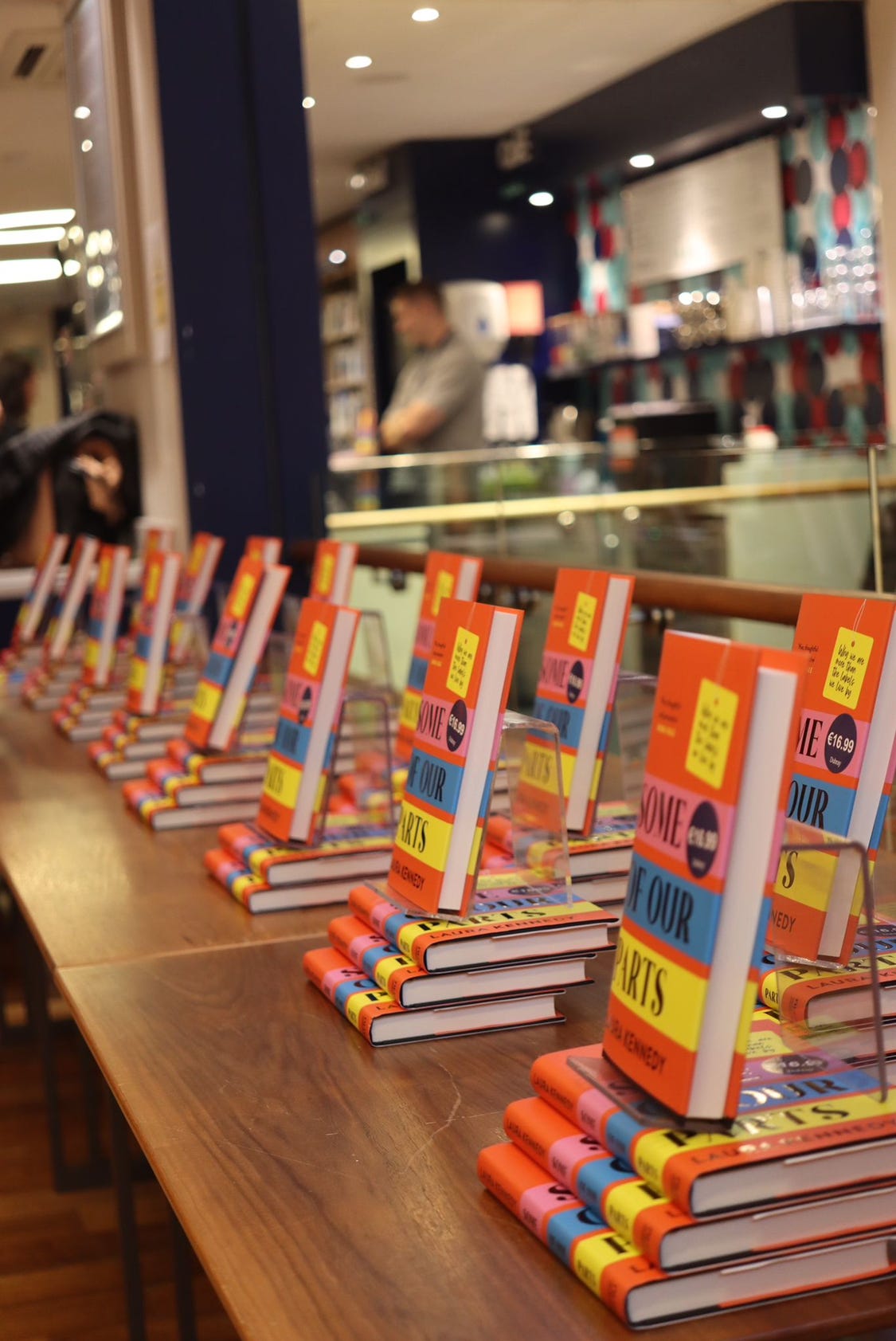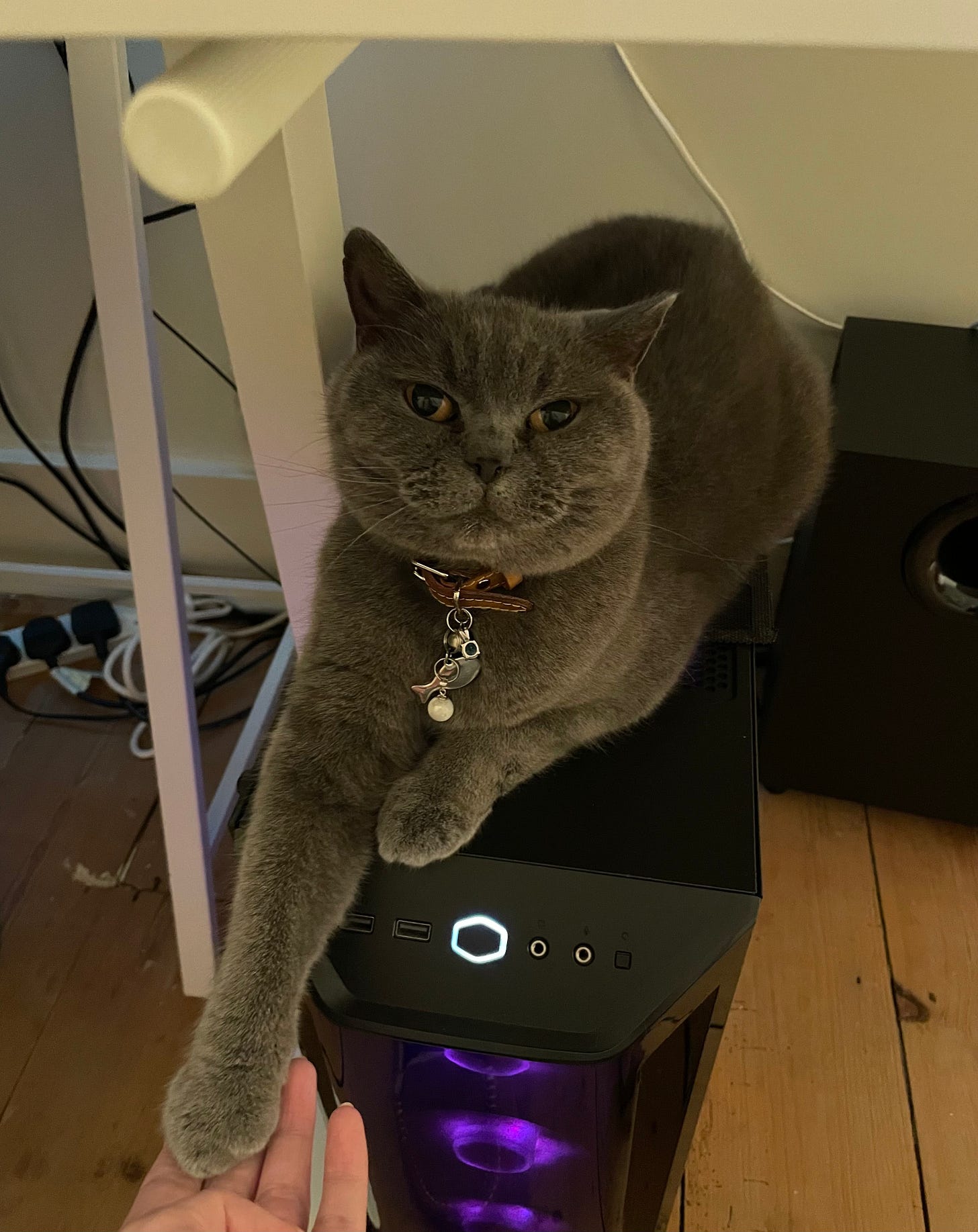What Does Success Look Like Now?
Status, money, autonomy and the pursuit of meaning. Also, a thank you as Peak Notions turns 3 today!
Thanks for reading Peak Notions. It’s an independent publication funded entirely by paid subscribers. If you’ve found yourself reading regularly over the last three years, sharing it with friends and finding value in my work, the best possible means of supporting the creation of more is with a paid subscription. This will gain you access to the full archive, audio versions of every column, bonus content, the weekly chat and the Peak Notions Book Club.
When an editor at Substack emailed me recently to ask if I would contribute advice for the graduating class of 2025 — alongside what the article describes as ‘top Substackers’ — I did what any reasonable Irish person would do. I considered how objectively unqualified I am to be described that way — or to be advising young people reeling forth, disoriented, into an incomprehensibly shifting, unknowable world where the only certainty seems to be abject pessimism. It is a situation to which people outside their generation, like me, can at best only tangentially relate. While we all live in a time when people can’t afford to leave home until they’re forty, influencers are telling us that grated cheese is basically asbestos, and your uncle Rory insists the world is run by sentient lizard people who invented fentanyl to sabotage traditional family values, it is another thing to be making your beginning inside that chaos.
I thought about what may be contained within my head that could possibly be of use to the people the Substack article was being written for. The only thing that murmured forth was the realisation that originally brought me to Substack three years ago — that there are very few settled questions in the world, and an awful lot of loud, overconfident people. There is no one clear or safe way to live. There’s only choice (when we’re lucky enough to have one) so we might as well pursue what we value. Human beings cannot get out of bed without purpose. Without meaning. So it makes sense that we should prioritise finding meaning, and that nobody else can reliably tell us where we’ll find it. We’re on our own in that search.
Three years ago this week, I made the choice to move this column over from the rudimentary Patreon page where it had been living and gave it a name that was in part a joke but in part a provocation. Perhaps it’s a longstanding bruise that I still routinely press as one of many Irish writers who have left home in order to love it without also kind of wanting to thump it over the back of the head. ‘Peak Notions’. In Irish culture, ‘notions’ is a concept we use to police the behaviour of others and to maintain the primary Irish social mandate — conformity, which is to say, consensus. In Irish culture, questions are often a kind of performance art because they are settled already. The answers have been assumed for some time now.
Notions is the sin of making oneself noticed for any particular reason. Standing in the wrong place. Saying the wrong thing. Being a man named Barry and wearing what is determined to be an overly exuberant pair of socks. ‘Oh’, barks a sardonic voice from somewhere in the room. It’s Barry’s boss or his mother or the guy who taught him physics when he was fourteen but can recall his flaws with a buttered ease twenty years later. ‘That’s Barry!’, they will say of his zesty socks. ‘A real character from the ankles down. Not backwards in coming forwards, Barry.’ What they mean is that poor Barry is a fool. A contemptible dullard in midlife crisis socks.
To have notions is to appear to harbour ideas of importance or unwarranted status. It is to say something other than what those around you are saying, to wear something other than what those around you are wearing. It is to express your accidental or purposeful entitlement not to conform through word or deed, however banal these words or deeds may be. It is to threaten the status quo by doing anything at all that calls it into question. Anything which reminds others it is there and could be looked at if someone had a mind to do so.
This all sounds very overblown when you realise I’m not necessarily talking about advocating for martial law or suggesting rounding up all the boomers and confiscating the summer houses they bought with far harder work than we’ll ever know, £1000 and a magic bean in ‘84, but perhaps wearing a brightly coloured jacket around your old school friends. Or simply being Barry, a heterosexual man wearing non-standard-issue socks and admitting to your family in a moment of rare vulnerability that you are thinking of taking dance lessons months after a particularly hard breakup.
At every family Christmas unto death, he will now be referred to as ‘Unwed Astaire’ or ‘Mikhail Barry-she-ran-off’. Irish people’s humour is a coping mechanism for all that pretty dreadful stuff that happened. Irish historian Liam Kennedy (no relation, probably) famously coined the acronym MOPE (‘Most Oppressed People Ever’) to characterise the paradigm Irish people apply to our own genesis and evolution. According to us, we’ve really had a seriously raw deal of it, actually, and the term MOPE is merely another injustice in an unjust history of really very unjust injustices.
Irish people find humour in everything, and it is my favourite thing about us — the darker, or sadder, or grimmer a thing is, the easier it is to stand in, or next to, if you can laugh at it. Yet beneath the humour we aim at one another is a warning that what you do is seen and noticed. You are weighed and measured. You are found to have fucking notions, Barry. Deal with your heartbreak by drinking alone at home or developing a shameful and secret OnlyFans addiction, and buy a pair of black socks like everyone else. But whatever you do, don’t take a salsa class. Where you are statistically guaranteed to be one of few single males? Where you might get out of your own head? Feel more at home in your body? Maybe meet some nice women who might possibly share your interests? That’s… gay.
But look, there is a way in which we are all a bit Irish. It’s difficult and embarrassing to be seen to try. It’s ‘cringe’. The world is comfortable only with the end of the story — the bit where the striving has paid off and you can post a photo on social media looking as though the effort didn’t exsanguinate you and your bed is definitely not, nor could it ever be, a mattress on the floor. The seeking, we find desperate. Unbearable to watch. The building. The asking. We cannot look directly at it without seeing ourselves, who incidentally we are disgusted by much of the time. Watching people try reminds us of our own failure, or our own lack of effort. It kind of interests us and it sort of makes us sick. It generates complicated feelings.
Three years into Peak Notions on Substack, I too have complicated feelings. I cannot present you with a clean success story that makes you feel a bit bad about yourself. Still, I am deeply proud of what I have achieved here with the support of readers. I feel profoundly lucky but I don’t feel a straightforward sense of success. Not the instagrammable kind. Not the kind anyone covets — the kind that will elevate a mattress off the floor. Peak Notions has grown but personally and financially, this has been a challenging year. I operate within an industry in which people equate money and status with success. I came here to Substack because I associate success with autonomy. With intellectual independence. With the freedom to think, say and write what I choose. I have that autonomy. That is a major achievement — it’s just not one that comes with much status or wealth.
This column goes into fourteen thousand inboxes each week. Hundreds of people pay to read and listen to it. This is objectively miraculous. As a Peak Notions reader, you are rewarding me with your time and attention for the very traits that got me in trouble throughout a mouthy Irish childhood and adolescence. Asking about where the settled answer came from, and if we’re really sure about it. Standing in the wrong place at the wrong time, wearing the wrong socks.
Substack subscribers directly enabled me to write Some Of Our Parts, published last September
That’s what it always comes down to here, in my own tiny corner of a vast internet. Trying to muster the courage to ask a question in a hostile room. You’ve felt it too, I’m sure. Our culture is a hostile room. The internet is a hostile room. Our own minds are, often, hostile rooms. We have to sometimes find the will to ask anyway. Over the last year, people reading this newsletter have enabled me to write about the merits of not taking a position - or a vocal one - on every issue people apparently feel strongly about; to explore the sinister reality behind why most things we consume online seem to be advice now; to consider the merits of resisting the ubiquitous online pressure to reflect other people’s values back at them in order to protect ourselves from criticism; to look critically and without screaming, crying or throwing up at why motherhood is becoming a less popular option for a growing number of women; to look at who is excluded from our public conversation on autism and what that means even though I knew doing so would annoy some autistic people (it did but that’s okay); to think about the crucial value of entertaining an idea or question without affirming it (ie not electing to get offended so much), and how we should get better at this for our own good; and to consider what it says about the state of our culture when people who identify as compassionate celebrate an intergenerationally wealthy young man shooting someone in the back. Readers here — especially those who paid to read and listen to my work this year— bought me the time and space to write a book based on what I’ve been doing on Substack. Again, miraculous.
None of these columns could have been published in standard media the way I have written them here. Some would likely never be published in any form. I started Peak Notions with a strong belief that there is an audience for this kind of writing, and that has been proved true. People don’t need to be spoken down to or spoon-fed the simplest, most emotionally manipulative version of an idea or story as fast as possible, like a restrained cat being made to swallow a tablet. This makes us stupider, angrier, less compassionate and worse at thinking. People have the capacity for nuance. In our time, I’m convinced that they’re starving for want of it. I certainly am.
The stories we are routinely exposed to about how our reality works are so often dumb and patronising, and we notice it. These monocausal, infantile accounts of how the world operates. Trump was elected because everyone is secretly racist. It’s Joe Biden’s fault Kamala Harris lost the election. Beef tallow is a functional sunscreen (that one makes me want to lie on the floor and give up- are you a roast potato?). Inclusivity is when people look different from me but affirm all my political views. Gender quotas are a clear and simple route to equality. Autism is caused by vaccines, actually. Deporting people for what they think is reflective of American values, actually, when those people don’t think what I think. An LGBTQ flag at a student protest where people are chanting in support of Hamas makes logical sense, actually. Every pope becomes the best pope the instant he dies, actually. There is no overlap between the stories we believe are important and the ones we are repeatedly told matter most this week, actually.
It pays online to be confident in the absence of knowing. Because the information isn’t there or is disputed, or because it’s hurty in my little fingers to type onto the keyboard to go looking for it, or because reading one thing feels big and true and that’s enough, so why bother reading anything I know I don’t already agree with? How could there possibly be anything of value in there? It pays to pretend that complicated things are simple because some of us wish this were true and some are terrified of people who believe it is. That friction is a lucrative business model.
I know how hard it is to work one’s way into the position I am privileged to occupy here because I’ve spent the last decade and more doing that work. I don’t denigrate or dismiss it just because Peak Notions is comparatively small. Unlike Luigi, I very sadly do not have a wealthy grandpa to subsidise my intellectual pursuits, lifestyle and interests. Mine died of a heart attack, falling off his bicycle on the way to his job at a factory in Limerick, where I grew up. No member of my immediate family went to university, let alone the lofty sort I found myself studying philosophy in, ill equipped and utterly baffled. In my culture and the community I come from, nobody was listening. To speak was to have notions. To write? To feel valuable enough to be read? Listened to? Unheard of. Almost criminal. Philosophy!? Peak Notions.
Mabel-the-cat is present during the writing of every Peak Notions column, and interrupts every audio recording without fail, because she is profoundly annoying and obscenely good looking, but supportive
So after three years here, I’m struck by both immense gratitude and a certain ambivalence. I’ve watched as Substack moved from something ignored by media and the wider culture to something taunted to something interesting or edgy to something cool. A place where people who feel valuable enough to be read and listened to now desire to be. It benefits all of us, and of course it is nicer to feel valued than disdained. It is nice, ever and at all, to feel seen. Writing has its own value, but its meaningfulness is constituted cooperatively between the writer and the reader. It is communication. I write for myself, to know what I think and to make sense of an ostensibly senseless reality, but I’m also writing for you. I’m so honoured that you’re there, on the other side of this, giving me a reason to keep doing it.
After a year that has been difficult in a number of ways, I’m very lucky to be here still doing what I’ve always been doing. I know that it’s been a hard time for many. I understand the value of your time and attention when everything is competing for it and there is so much to worry about. I understand the sacrifice of the people who choose to pay for the written and audio content I create here. By supporting me, you are likely forgoing something else. The nicer shampoo that you like. The lovely, fragranced one. A cup of coffee and a pastry that you could enjoy with your friend over a gently sticky café table and some restorative people watching. Getting the bus instead of an Uber on a chilly evening when you’re tired and overwhelmed by resentment for your idiot colleague Carol, who is so unbelievably bad at her job that sometimes you fantasise about sewing raw prawns inside the lining of her stupid royal blue Michael Kors handbag. I get it.
I’m very grateful. Your support has changed my life. It has helped me find my autonomy. I hope that Peak Notions can help you find yours in a world where nothing is ever simple, monocausal, or obvious, actually.
My book on our relationship with identity in a world unhealthily obsessed with it — Some of Our Parts: Why We Are More Than the Labels We Live By — is out now.








congratulations - and thank you for everything you give as a part of this
I wish I could write as well as you, I was nodding throughout the post because of the clarity of what you were putting forth. It takes sooooo much time, thinking time, to chisel away at all kinds of notions, Irish or otherwise, before being able to find clarity in writing. Well, done, really, brava! Your posts are a great stimulus for someone like me, hitting 70 next year, dealing with the bafflement of why 'thing's are the they way are in our world ... when my daughter was born in 1989, the Berlin Wall was torn down, the Iron Curtain came asunder, and I was just so happy thinking that 'things' could only get better. Sigh. I am half Italian, and was brought up by Irish nuns at a boarding school in England, but the teachers were lay. That was my first encounter with the 'notions' you write of. Ony I thought it was a British thing. Don't show off. Fit in. Be modest. Deprecative stuff. I expect each culture has its own version of notions-ness, haha. What used to really bug me was the "common sense" thing. Why do we do things this way? Well, it's common sense, that's why. The norm was common sense, yes, but 'common' to whom? We are certainly living in interesting times. Reaching for simplistic versions, so dangerous, is only human but we must keep up our Emotion Intelligence approaches in this regard. Keep writing !!!